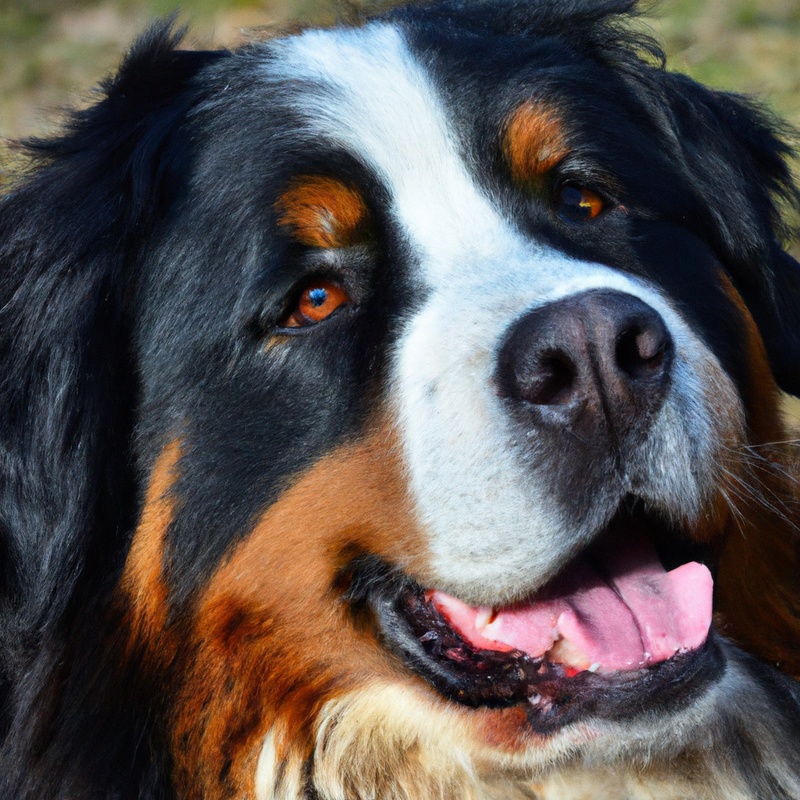How Much Exercise Does a Bernese Mountain Dog Require?
Key Takeaways:
- Bernese Mountain Dogs require moderate daily exercise to maintain their overall well-being.
- Engaging them in physical activities for at least 30-60 minutes a day is recommended.
- Providing mental stimulation alongside physical exercise is crucial for their mental health.
- While they enjoy outdoor activities, these dogs may have limitations due to their large size and predisposition to certain health issues.
Are you ready to embark on an exercise journey with your furry friend? If you’re a proud Bernese Mountain Dog owner, you’ve come to the right place! As an expert on dog fitness and wellness, I’m here to guide you through the ins and outs of how much exercise your Bernese Mountain Dog requires.
These majestic canines have specific needs that will benefit their physical and mental well-being.
But how much is enough? In this article, we’ll explore the importance of exercise, understand their exercise needs, provide daily exercise recommendations, talk about tailoring routines, address potential challenges, and answer frequently asked questions.
Get ready to unleash the energy and discover the ideal exercise routine for your Bernese Mountain Dog!
| Exercise Level | Description |
|---|---|
| Low | Bernese Mountain Dogs have a low exercise requirement and are generally not very active. |
| Moderate | A moderate exercise level is recommended for Bernese Mountain Dogs, including regular walks and playtime. |
| High | Some Bernese Mountain Dogs may have a high exercise requirement, especially if they have a lot of energy or are working dogs. They may benefit from activities such as hiking, running, or participating in dog sports. |
Importance of Exercise for Bernese Mountain Dogs
Physical and mental health benefits of exercise for dogs
Exercise is incredibly important for the physical and mental health of dogs. Regular exercise helps to keep your dog physically fit, maintain a healthy weight, and prevent obesity-related health conditions.
It also provides mental stimulation and helps to alleviate boredom, which can reduce behavioral issues such as excessive chewing or barking.
Additionally, exercise promotes a healthy cardiovascular system, strengthens muscles and bones, and improves flexibility and coordination. It is essential to provide your dog with appropriate exercise based on their breed, age, and energy levels.

Understanding the Exercise Needs of Bernese Mountain Dogs
Factors that influence an individual dog’s exercise requirements
The exercise needs of individual dogs can vary depending on several factors. These factors include the dog’s age, breed, size, and overall health.
Younger dogs generally require more exercise than older dogs, and larger breeds often need more activity than smaller breeds.
Additionally, high-energy breeds may have higher exercise requirements compared to low-energy breeds. It’s also important to consider your dog’s specific health needs and consult with your veterinarian to determine the appropriate amount and type of exercise for your furry friend.

Typical energy levels and activity levels of Bernese Mountain Dogs
Bernese Mountain Dogs are typically large and energetic breeds.
They have moderate energy levels and require regular exercise to stay healthy and happy.
A daily walk or two, along with some playtime, should be sufficient to meet their activity needs.
These dogs also enjoy engaging in outdoor activities like hiking, swimming, or playing fetch.
However, it’s important to avoid overexertion or excessive exercise, especially during hot weather, as Bernese Mountain Dogs are prone to overheating.

Daily Exercise Recommendations for Bernese Mountain Dogs
Guidelines for daily exercise duration and intensity
When it comes to daily exercise for Bernese Mountain Dogs, it’s important to find the right balance. Here are some guidelines to keep in mind:
- Duration: Aim for at least 30 minutes to an hour of exercise each day. This can be split into multiple sessions to prevent overexertion.
- Intensity: Moderate exercise is best for these dogs, as they have a tendency to overheat. Brisk walks, gentle hikes, or swimming are great options.
- Adjust for age and health: Puppies and senior dogs may require less exercise, while younger adults may have more energy. Always consult with your vet to determine the right amount of exercise for your individual dog.
Remember, exercise is just one part of overall dog care. Providing mental stimulation and a balanced diet are equally important.
So, enjoy getting active with your Bernese Mountain Dog, but always prioritize their well-being.
Suggested activities to fulfill exercise needs
To fulfill the exercise needs of your Bernese Mountain Dog, try engaging in activities such as:
- Daily walks: Take your furry friend for brisk walks to provide both physical exercise and mental stimulation.
- Play fetch: This classic game can help burn off excess energy and strengthen the bond between you and your dog.
- Hiking or trail running: Bernese Mountain Dogs love being outdoors, so explore nature together and enjoy the benefits of a challenging hike or jog.
- Swimming: If you have access to a safe swimming area, let your dog take a dip. Swimming is a low-impact activity that can be refreshing and enjoyable for your pup.
- Canine sports: Consider enrolling your dog in activities like agility, obedience, or tracking. These sports offer mental and physical challenges for your dog and can be a great way to bond with your furry companion.
Tailoring Exercise Routine for Bernese Mountain Dogs
Considerations for puppies, adult dogs, and senior dogs
Puppies, adult dogs, and senior dogs have different exercise needs. For puppies, it’s essential to have shorter, frequent exercise sessions to prevent overexertion and support proper growth.
As adult dogs, they benefit from moderate intensity exercises that meet their energy levels and help maintain a healthy weight.
Senior dogs require gentle, low-impact exercises that minimize stress on their joints and muscles. Always consider their age, health, and individual needs to ensure a safe and enjoyable exercise routine for your furry friend.
Adjusting exercise routine based on individual dog’s health and abilities
When adjusting your dog’s exercise routine, it’s important to consider their individual health and abilities. Start by assessing your dog’s overall health, including any existing medical conditions.
Consult with your veterinarian to determine the appropriate exercise intensity and duration.
Take note of your dog’s energy levels and monitor their response to exercise. Be mindful of any signs of fatigue, discomfort, or excessive heat.
Adjust the routine as needed to ensure your dog’s well-being and to prevent any potential injuries or health issues.
Potential Challenges in Exercising Bernese Mountain Dogs
Weather limitations and indoor exercise options
Weather limitations can pose challenges when it comes to exercising a Bernese Mountain Dog. Harsh weather conditions like extreme heat, cold, or heavy rain may make outdoor activities difficult or even dangerous.
However, there are indoor exercise options to keep your furry friend active.
Consider playing interactive games, using puzzle toys, or setting up obstacle courses indoors. Additionally, you can enroll your dog in indoor agility classes or use a treadmill specifically designed for dogs.
These alternatives can ensure your Bernese Mountain Dog gets the exercise they need regardless of the weather.
Dealing with physical limitations and health conditions
If your Bernese Mountain Dog has physical limitations or health conditions, it’s important to adjust their exercise routine accordingly. Start by consulting with your veterinarian to understand any limitations or restrictions your dog may have.
They can provide guidance on appropriate exercise levels and activities.
Consider low-impact exercises like swimming or gentle walks to minimize strain on their joints. Additionally, monitoring their weight and providing a balanced diet can help manage certain health conditions.
Regular check-ups and open communication with your vet will ensure your dog’s exercise plan is tailored to their specific needs.
Frequently Asked Questions about Exercise for Bernese Mountain Dogs
What happens if a Bernese Mountain Dog doesn’t get enough exercise?
If a Bernese Mountain Dog doesn’t get enough exercise, it can lead to various issues.
Firstly, they may become overweight, which can put strain on their joints and lead to health problems.
Secondly, they may become bored and exhibit destructive behavior like chewing or digging.
Thirdly, they may have pent-up energy, resulting in restlessness, anxiety, or even aggression.
Regular exercise is crucial for their physical and mental well-being, so make sure to provide them with enough activity to keep them happy and healthy.
Can Bernese Mountain Dogs do well in apartments without much outdoor space?
Bernese Mountain Dogs are large and active dogs, so they generally don’t do well in apartments without much outdoor space.
They thrive in environments where they have room to roam and exercise.
Limited space can lead to behavioral problems like excessive barking and restlessness.
However, if you live in an apartment, you can still meet their exercise needs by taking them on regular walks, visiting nearby parks, and engaging in indoor activities like puzzle toys and training sessions.
Remember, every dog is different and may have varying exercise requirements, so consider your Bernese Mountain Dog’s individual needs.
How to recognize signs of over-exercise in a Bernese Mountain Dog?
It’s important to be able to recognize signs of over-exercise in your Bernese Mountain Dog. Look out for excessive panting, difficulty breathing, limping, or reluctance to continue exercising.
Monitor their energy levels during and after exercise.
If they seem unusually tired, lethargic, or are struggling to recover, it may be a sign of overexertion. Pay attention to any signs of pain or discomfort as well.
Regular breaks and modifying exercise intensity can help prevent over-exercise.
Consulting your vet is always a good idea if you have concerns.
Final Verdict
It is clear that exercise is vital for the overall health and well-being of Bernese Mountain Dogs. Regular physical activity not only helps them maintain a healthy weight, but also supports their mental stimulation and socialization needs.
Understanding their individual exercise requirements, tailoring their exercise routines, and addressing potential challenges are all essential for keeping these majestic dogs happy and thriving.
By providing them with the right amount and type of exercise, we can ensure that Bernese Mountain Dogs lead fulfilling lives. Trust me, as an expert in dog care, I can confidently say that investing time in their exercise routine will undoubtedly pay off in the long run.







